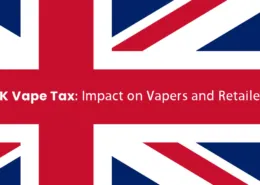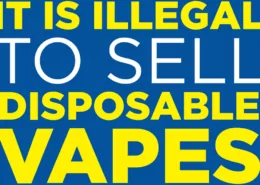UK Government Issues Guidance on Upcoming Ban of Single-Use Vapes
The UK government has released official guidance detailing its plan to prohibit the sale of single-use, disposable vaping devices starting from June 1, 2025. This comprehensive ban will make it illegal for businesses to sell, offer for sale, or possess for the purpose of selling any vaping products designed for single use only. The new regulations apply to all such devices, whether or not they contain nicotine, and cover both online and physical retail sales across England, Scotland, Wales and Northern Ireland.
Defining Disposable vs. Reusable Vapes
To help businesses comply with the forthcoming rules, the guidance provides clear criteria distinguishing single-use vapes from reusable ones. A vaping device is considered disposable if it is “neither designed nor intended to be reused” after its initial liquid or battery is depleted. In contrast, a vape qualifies as reusable only if it is both rechargeable and refillable by the user.
More specifically, a reusable vape must have a rechargeable battery and the ability for the user to replace the heating coil, either directly or as part of a removable pod or tank. Replacement coils, pods, or e-liquid bottles must be widely available for separate purchase. Merely having a rechargeable battery is insufficient if the coil or pod cannot be changed out by the consumer with readily obtainable components.
Similarly, a refillable vape must allow the user to replenish the vaping liquid, whether by opening the tank, replacing a cartridge, or inserting a new pre-filled pod. Extra pods or bottled e-liquid should be sold separately from the device itself. A recyclable but non-refillable design does not meet the reusability standard.
Enforcement and Penalties Vary by Region
Responsibility for enforcing the single-use vape ban will be shared by multiple regulatory agencies, including UK Border Force, the Medicines and Healthcare products Regulatory Agency (MHRA), the Office for Product Safety and Standards (OPSS), and local Trading Standards authorities. These bodies will have the power to inspect businesses and remove any non-compliant stock from the market.
The specific penalties for violating the new law differ between the four constituent nations of the UK:
- In England, initial breaches will incur civil sanctions such as stop notices, compliance notices, and fines of £200 or more. Repeat offenders may face criminal prosecution resulting in unlimited fines and/or up to 2 years imprisonment. Additional financial penalties can be imposed to recover enforcement costs.
- In Wales, punishment for infractions includes fixed penalties of £200, variable fines, cost recovery notices, stop notices, and non-compliance actions.>>> read more
- In Scotland, supplying or offering to supply banned products is a criminal offense from the start, subject to fines up to £5,000 and imprisonment up to 2 years on indictment. Failure to comply with enforcement notices risks fines up to £5,000. >>> read more
- In Northern Ireland, offenders can receive summary conviction fines up to £5,000 and 2 years in prison for repeated violations. Obstructing enforcement carries fines up to £5,000. >>> read more
Preparing for Compliance
To prepare for the June 1, 2025 deadline, vaping retailers, wholesalers, importers and manufacturers should take immediate steps to wind down production, distribution and sales of disposable devices. Key priorities are to cease procurement of new disposable stock, sell through existing inventory without replenishment, and transition to products that demonstrably meet the reusability criteria.
Any leftover non-compliant merchandise still on hand when the ban takes effect must be quarantined from legal inventory, conspicuously marked as not for sale, and securely stored away from retail shelves until properly disposed of through a licensed waste management service. Attempting to sell banned products after the deadline risks severe financial and legal consequences.
Recycling and Waste Management
Both disposable and reusable vapes are classified as electrical waste under UK WEEE (Waste Electrical and Electronic Equipment) regulations. Retailers must provide a way for customers to return used devices, components and accessories for recycling, free of charge and with no requirement for a new purchase.
Disposable vapes returned by consumers after the ban’s effective date will likewise need to be accepted and processed in accordance with WEEE rules. Failure to provide mandated takeback and recycling options can result in further enforcement action beyond the penalties for selling non-compliant merchandise.
All vaping waste should be disposed of via dedicated recycling programs equipped to handle batteries and electrical components safely. Haphazard or concealed disposal creates unacceptable hazards for waste workers, property, and the public.
Check Reusability Before Sourcing New Stock
Going forward, the vaping industry and its customers have an obligation to carefully research the reusability of devices before offering them for sale or purchase. For nicotine-containing products, consulting the MHRA‘s list of registered devices can help verify key characteristics. However, this database alone is not definitive, as non-nicotine vapes do not require MHRA registration.
Ultimate responsibility for ensuring and attesting to a device’s reusability under the new standards rests with businesses at every stage of the supply chain. Documenting reusability claims and the availability of replacement components will be an essential practice to defend against liability.
Other Ongoing Safety Obligations
While the single-use vape ban is a milestone public health and environmental intervention, it does not alter the vaping industry’s underlying duty to ensure all products comply with UK regulations on labelling, safety, restricted ingredients, nicotine limits, and other consumer protection measures. The guidance emphasizes that enabling products in the legal vaping market must meet all other applicable standards under current and future law.
Through this ban and guidance, the government affirms its commitment to making vaping a less wasteful and potentially less harmful alternative to smoking, while upholding consumer safety. Businesses that proactively align with the new reusability mandate will be best positioned to continue serving the needs of adult vapers responsibly and sustainably into the future.
- Malaysia Negeri Sembilan Backs Vape Ban, Awaits Clear Laws - August 5, 2025
- Is It Illegal to Vape or Smoke While Driving in Massachusetts? - August 5, 2025
- Austria Plans to Ban Disposable E-Cigarettes - August 5, 2025









